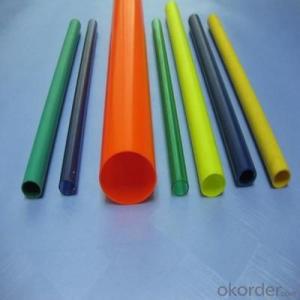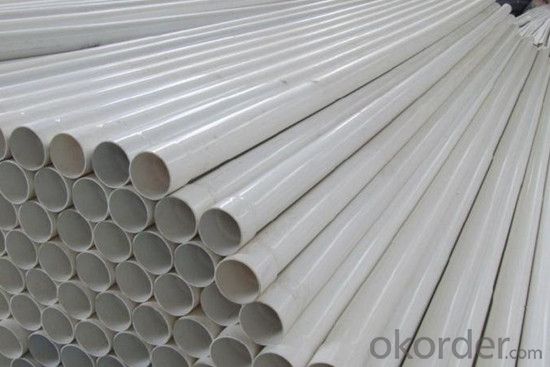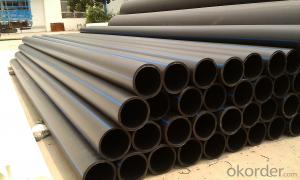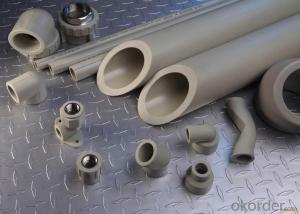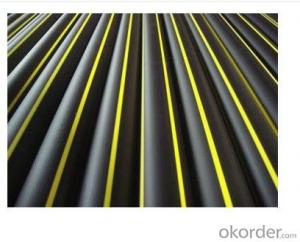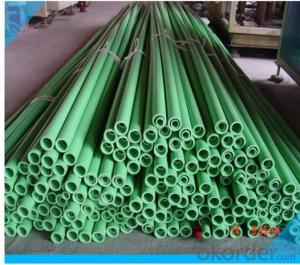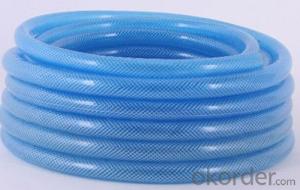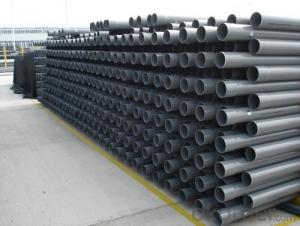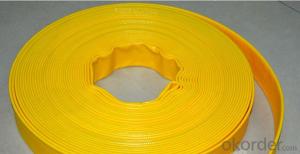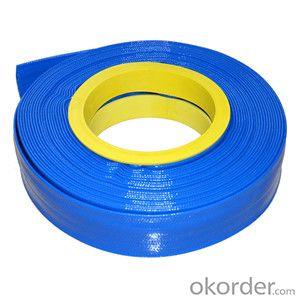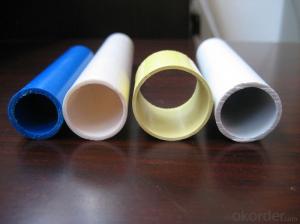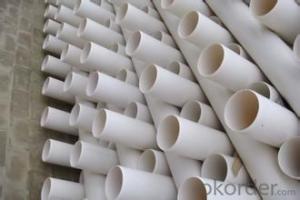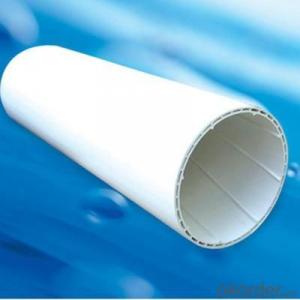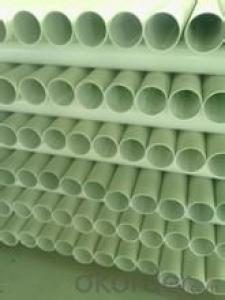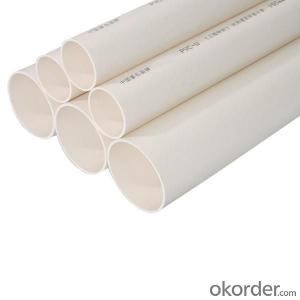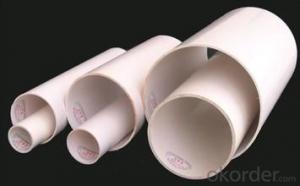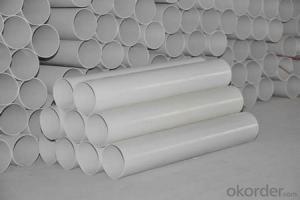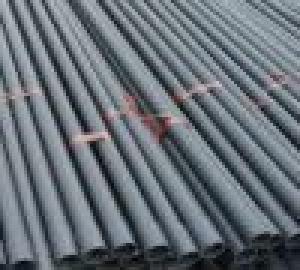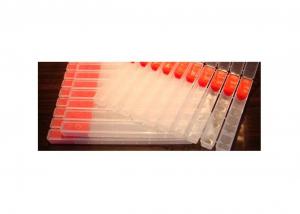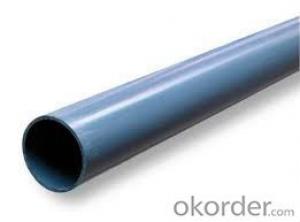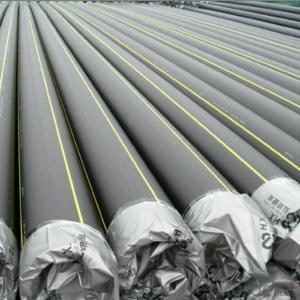Plastic Tubes - PVC Pipe 1.25MPA Material:PVC, Specification:16-630mm, Length:5.8/11.8m
- Loading Port:
- China main port
- Payment Terms:
- TT OR LC
- Min Order Qty:
- 500 m
- Supply Capability:
- 20000 m/month
OKorder Service Pledge
OKorder Financial Service
You Might Also Like
1.Description of PVC Pipe :
Material: Virgin Rigid PVC resin, no recycle material
Process: vacuum forming extrusion
Color: various colors, we can make color according to Panton card No.
Quality Standard: Smooth surface, no spot, no shrink mark, no surface quality defect.Check from cross section, homogeneous in density, good plasticizing degree, relative chemical/physical property meet customer requirement. We supply different environment protection products to meet different market requirement.
2.Features of PVC Pipes :
1) Light weight, easy to load and unload: PVC pipe is very light, convenient to handle loading unloading, and installing.
2) Good chemicals and drugs resistance: PVC pipe has its excellent resistance to the erosion caused by acids and alkalines, a great help to the chemical industries.
3) Small resistance to fluidity: The smooth surface reduces resistance to the fluids. Its roughness coefficient is only 0.009, much less than other pipes, Under same discharges, smaller cabibre of the pipe can be uesd.
4) Strong mechanical strength: Good resistance to water pressure, outside impact and pressure, is satisfied under any conditions.
5) Good electrical insulation: excellent insulation nature against electricity. the pvc pipe can be served as conduits and pipes in construction cable and wire.
3.PVC Pipe Images:
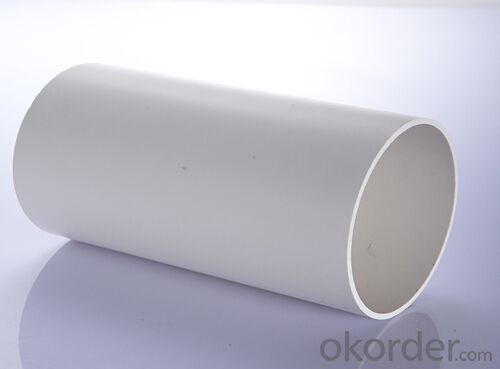
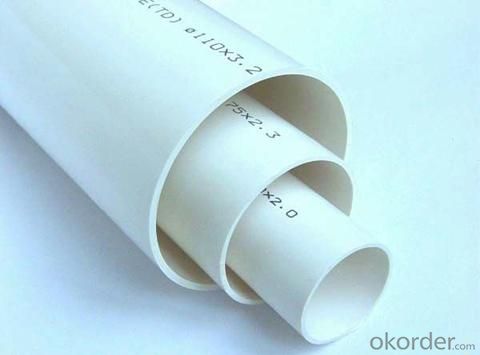
4.Specifications of the PVC Pipe:
1) Material: pvc pipe unplasticized polyvinyl chloride
2) Standard: GB, ISO9001, ISO14001
3) Color: white pvc pipe, grey pvc pipe , etc.
4) Specific Gravity:g/cm3, 20(C): 1.35 - 1.55
5) Vicat Softening Temperature: (C) >=79
6) Longitudinal Reversion: %, 150(C) <=5< span=""><>
5.FAQ
Q:What is you MOQ?
A:As customer’s request.
Q:What is the production ability? or delivery time?
A:Our production ability support 40HQ order finish in one week.
Q:Can we have sample?
A:Sample free, freight cost you.
Q:For urgently doubts,who online?
A:Sales and marketing Manager 24hours online service.
- Q: What are the common uses for plastic tubes in construction?
- Plastic tubes are commonly used in construction for various purposes such as plumbing, electrical wiring, and ventilation systems. They are also utilized for underground utilities like water supply and drainage systems. Additionally, plastic tubes are used for structural support in concrete formwork and as conduits for cables and wires.
- Q: Can plastic tubes be used for bottling beverages?
- Yes, plastic tubes can be used for bottling beverages.
- Q: I have a 1 year old Robo hamster named Jewel. She has PLENTY of food (slightly chubby lol) and things to chew on..yet she is chewing on the plastic hamster tubes? She lives in a 10 gallon tank and has a silent spinner and toys (and a hut) 1.can she chew THROUGH the tube and escape? 2.can this hurt her health?
- 1) No, the tube would be pretty hard to get through for its rounded shape. 2) Only if she swallows the plastic, which is highly unlikely, as I said before, it would be unlikely for her to physically chew through the tube. Check on her occasionally, and make sure to get her used to chew toys, I have cardboard tubes (from Pets at home) for both my Guinea Pigs and Hamster ^^
- Q: What are the common thicknesses for insulation plastic tubes?
- The common thicknesses for insulation plastic tubes vary depending on the specific application and insulation requirements. However, typical thicknesses for insulation plastic tubes range from 1/8 inch (3.2mm) to 1/2 inch (12.7mm).
- Q: Can plastic tubes be used for automotive components?
- Yes, plastic tubes can be used for automotive components. Plastic tubes are commonly used in various applications within the automotive industry, such as fuel lines, coolant hoses, and vacuum systems. They offer advantages such as durability, flexibility, and resistance to corrosion, making them suitable for many automotive applications.
- Q: Are plastic tubes resistant to mold or mildew?
- Yes, plastic tubes are generally resistant to mold or mildew growth due to their non-porous nature and resistance to moisture.
- Q: How to calculate joint parts for hot melt connection of water supply plastic pipe?
- The hot melt connection directly connects the pipe and does not need the fittings,If flanges, flanges, or hot melt inserts or electrofusion connections are used, the fittings shall be determined according to the design drawings and field conditions.
- Q: Can plastic tubes be used for HVAC systems?
- Yes, plastic tubes can be used for HVAC systems. Plastic tubes, such as polyvinyl chloride (PVC) or high-density polyethylene (HDPE), are commonly used for various applications in HVAC systems, including drainage, condensate lines, and refrigerant lines. These plastic tubes offer advantages like durability, corrosion resistance, and ease of installation, making them a suitable choice for HVAC installations. However, it is important to follow industry standards and guidelines when selecting and installing plastic tubes in HVAC systems to ensure proper functioning and safety.
- Q: What are the different end closures available for plastic tubes?
- There are several different end closures available for plastic tubes, including screw caps, flip-top caps, snap-on caps, push-pull caps, and dispensing caps. These closures provide various functionalities such as sealing, easy access, controlled dispensing, and reusability, depending on the specific requirements of the product or application.
- Q: What is the minimum bending radius of plastic tubes?
- The minimum bending radius of plastic tubes depends on the specific type of plastic being used. However, as a general rule, most plastic tubes have a minimum bending radius of around 1-2 times the tube's outer diameter.
Send your message to us
Plastic Tubes - PVC Pipe 1.25MPA Material:PVC, Specification:16-630mm, Length:5.8/11.8m
- Loading Port:
- China main port
- Payment Terms:
- TT OR LC
- Min Order Qty:
- 500 m
- Supply Capability:
- 20000 m/month
OKorder Service Pledge
OKorder Financial Service
Similar products
Hot products
Hot Searches
Related keywords
